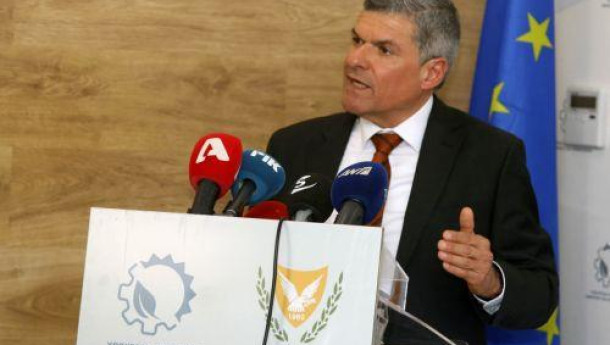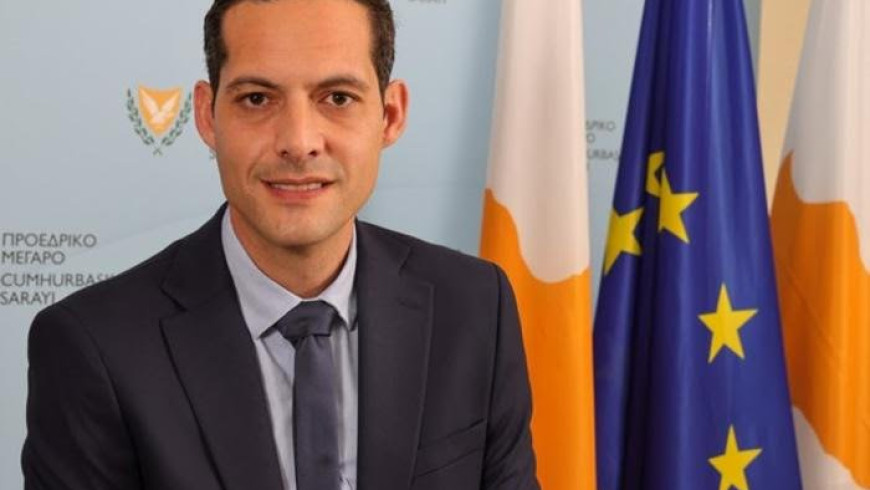
Minister of Energy George Papanastasiou said Tuesday that Cyprus’ strategy concerning the exploitation of natural gas found in Cyprus Exclusive Economic Zone (EEZ) and other fields in the region, will be decided after a workshop at the end of the month, with the participation of energy companies active in the Eastern Mediterranean.
Speaking Tuesday at the 13th Nicosia Economic Congress, the Minister reiterated the shift in the government’s energy policy, that is now favouring exploitation of Cypriot natural gas and other natural gas fields in the region for the purposes of power generation in Cyprus, combined with the possibility of exporting liquefied natural gas to Europe.
Papanastasiou highlighted the need to take advantage of the window offered by the European Union, which considers natural gas as a “transition” fuel towards achieving the goals of the Green Agreement. He added that the Ministry is working in this direction in order to have a substantial reduction in the cost of the energy in Cyprus. He added that for that purpose Cyprus should turn attention to securing quantities of natural gas, mainly from the Eastern Mediterranean region.
He noted that since 2009, about 78 trillion cubic feet of natural gas have been discovered in the Eastern Mediterranean, with 21 of those estimated to be currently available for export.
Papanastasiou pointed out that Cyprus had its first natural gas discovery in December 2011 and since then, quantities ranging from 12 to 15 trillion cubic feet have been discovered in the Cypriot EEZ.
“So, it is not possible in 2023 to still be discussing exploitation options, even ignoring the obvious: that part of our deposits will definitely have to be transferred to Cyprus for electricity generation purposes", he stressed.
He added that for the final formulation of the government’s new strategy, they have invited to Cyprus at the end of this month, the companies active in the entire natural gas chain in the wider region.
"Our aim is to hold a very specialized workshop where all those involved - technocrats, state advisers, experts and professionals in the field - will discuss the Government's plans, with the aim of finding concrete, sustainable solutions," he said.
Among Nicosia's options, as Papanastasiou said, in addition to the solution of importing liquefied natural gas that will reach Vassiliko for regasification at the terminal under construction, is also the transfer of natural gas in Cyprus in gaseous form, through a pipeline.
"As long as companies and investors can take advantage of the synergies in existing and planned infrastructure, offered in the Eastern Mediterranean due to the proximity of gas discoveries, this will also be the most advantageous solution for our country, thus ensuring natural gas in lower prices," he added.
He explained that this gas will be able to be channeled to the domestic market, initially for power generation, while quantities can, at the same time, be liquefied in a liquefaction station (FLNG or Modular technology) that will be built in Vassiliko, with the aim of exporting "Cyprus' position in the heart of the Eastern Mediterranean and very close to the Suez Canal is ideal for this purpose," he added.
The Minister also stressed the importance of having storage space in the electricity supply network, so that the energy produced by renewable energy sources, namely photovoltaics, is not wasted. He said that important grants for batteries will be announced soon. "Without batteries, the energy will be rejected since the grid cannot absorb it," he added.
Besides, he warned that if Cyprus does not do something both in terms of energy storage and the promotion of the electronic interconnections, such as Euro Asia Interconnector, "we will have losses of 300 megawatts, we will have blackouts: We will risk blackouts".
At the same time, Papanastasiou pointed out that the pollutants produced in Cyprus are estimated at 3 million tons, which entail costs for the consumer.














 3287.99
3287.99 1275.09
1275.09
